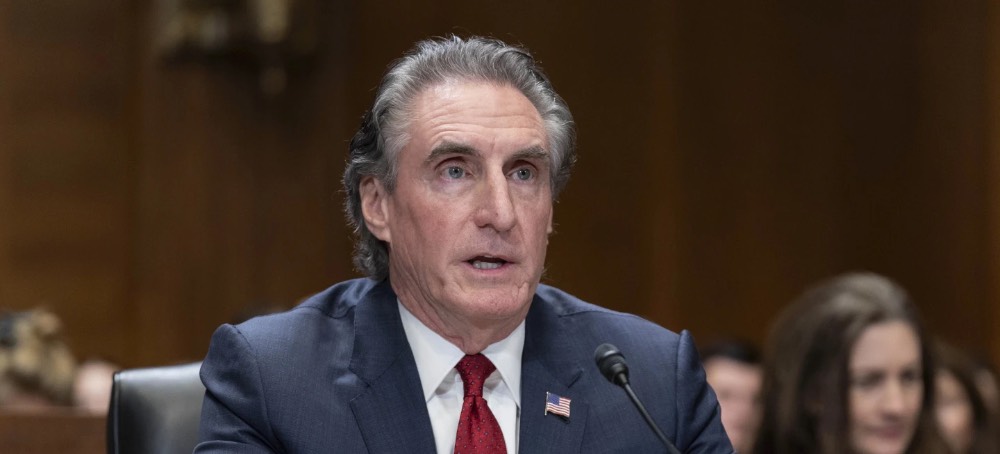Doug Burgum, Trump’s Pick for Public Lands Boss, Questions Reliability of Renewable Power
Matthew Brown, Jennifer Mcdermott and Jack Dura AP Former Gov. Doug Burgum, President-elect Donald Trump's choice to lead the Interior Department as Secretary of the Interior. (photo: Jose Luis Magana/AP)
Former Gov. Doug Burgum, President-elect Donald Trump's choice to lead the Interior Department as Secretary of the Interior. (photo: Jose Luis Magana/AP) Doug Burgum, Trump’s Pick for Public Lands Boss, Questions Reliability of Renewable Power
Matthew Brown, Jennifer Mcdermott and Jack Dura APFormer North Dakota Gov. Doug Burgum described Trump’s aspiration to achieve U.S. “energy dominance” as a way to counter demand for fossil fuels from autocratic nations — Russia, Iran and Venezuela — that have fewer environmental safeguards.
Burgum also said the U.S. needs to make more “baseload” electricity from coal and other sources as it seeks to power data centers for the nation’s tech industry. If confirmed, Burgum would become the chief steward of federal lands.
“This is something that is critical to our national security,” Burgum said. “Without baseload we’re going to lose the AI arms race to China.”
The Republican’s security claims were challenged by Hawaii Democrat Sen. Mazie Hirono who said military leaders have described global warming as a threat that could trigger instability and wars.
“For you to take a position that you are going to engage in actions that result in burning more fossil fuels is troubling,” Hirono said.
Fossil fuels — oil, natural gas and coal — cause climate change. When they burn, greenhouse gases are released. Asked if he thinks climate change is a problem, Burgum said he believed it’s a “global phenomenon.”
The Interior Department oversees a half-billion acres of federal land and vast areas offshore. Combined those areas produce about one-quarter of U.S. oil, or more than 1 billion barrels of crude annually, making them a flashpoint in the debate over how to address climate change.
President Joe Biden’s administration scaled back new oil and gas sales from public reserves as part of its efforts to curb climate change. Nevertheless, oil production hit record levels under the Democrat as high prices spurred drilling on lands that were previously leased.
Trump has vowed to increase drilling for oil and gas. And he’s been hostile to renewable energy including offshore wind. Burgum said Thursday that he wouldn’t try to convince his boss about its benefits.
Sen. Angus King, I-Maine noted that North Dakota gets more than one-third of its electricity from onshore wind turbines.
Burgum replied that the electric grid needs more resources that provide power continuously, as opposed to “intermittent” sources such as solar and wind that fluctuate.
“We’ve got massive tax incentives for people that want to do intermittent” power, Burgum said. “The balance is out of whack.”
Trump has vowed to end the offshore wind industry when he returns to the White House. Trump tasked Rep. Jeff Van Drew, who is a vocal critic of offshore wind, with writing an executive order he could issue to halt wind energy projects. The New Jersey Republican told The Associated Press Wednesday that he emailed that draft order to Burgum.
King also asked Burgum if he would commit to continuing with offshore wind leases that have been issued. Burgum said projects already approved that make sense will continue.
Burgum is an ultra-wealthy software industry entrepreneur who grew up in a small North Dakota farming community working at his family’s grain elevator. The two-term governor of the oil-rich state endorsed Trump after ending his own 2024 presidential bid.
Trump in November tapped him to be interior secretary and to chair a new energy council charged with promoting oil and gas development. The council could play a key role in Trump’s effort to sell more oil and other energy sources to allies in Europe and around the globe.
Burgum as governor outlined plans to make the state carbon neutral by 2030. And he touted a pipeline that would be used to capture and store greenhouse gases that fuel climate change. Burgum told lawmakers Thursday the U.S. has an opportunity to remove the carbon from burning fossil fuels while promoting new development.
“If we can decarbonize traditional fuels cheaper than we can subsidize some of the renewables, that’s something we should look at,” he said.
Carbon-capture skeptics say the technology is untested at scale and allows the fossil-fuel industry to continue largely unchanged.
The Interior Department’s mandate extends beyond fossil fuels to include grazing, mining, fish and wildlife conservation, the National Park system and has oversight responsibilities for more than 500 Native American and Alaska Native tribes.
Utah Republican Sen. Mike Lee, chair of the Senate Committee on Energy and Natural Resources, questioned Burgum about the expansion of national monuments, including Bears Ears and Grand Staircase-Escalante in his home state, under the Antiquities Act.
The monuments were created over the objections of state officials. Burgum appeared to sympathize with Lee’s concerns. The nominee said the original intent of the 1906 law was for “Indiana Jones-type archaeological protections” of objects within the smallest possible area.
Burgum later touted the many potential uses for public lands including recreation, logging and oil and gas production that can boost local economies.
“Not every acre of federal land is a national park or a wilderness area. Some of those areas we have to absolutely protect for their precious stuff, but the rest of it – this is America’s balance sheet,” he said.
